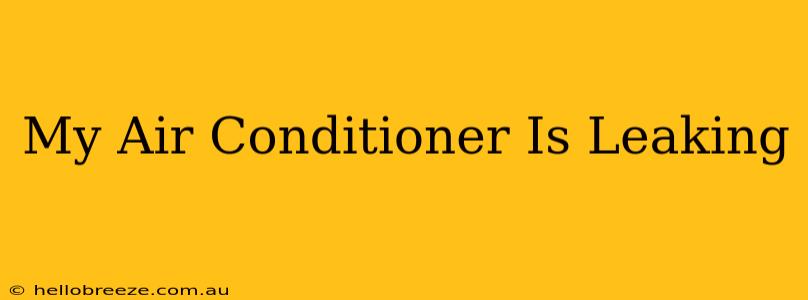Is your air conditioner leaking water? It's a frustrating problem, but thankfully, often solvable without calling a pricey professional. This guide will walk you through the common causes of AC leaks and how to fix them, saving you time and money.
Understanding AC Leaks: Why is My Air Conditioner Leaking Water?
Before diving into solutions, let's understand why your air conditioner might be leaking. Most leaks stem from issues with condensation, drainage, or the unit itself. Here are the key culprits:
1. Clogged Drain Line: The Most Common Culprit
This is the most frequent reason for AC leaks. Your AC unit removes moisture from the air, and this moisture collects as condensation. This condensation needs to drain properly. A clogged drain line prevents this, leading to water overflow and leaks. Common culprits for clogs include:
- Dust and debris: Normal airborne particles can build up over time.
- Algae and mold: These can grow in the standing water, further restricting drainage.
2. Frozen Evaporator Coil: A Sign of Trouble
A frozen evaporator coil is a serious issue that can lead to leaks. Freezing typically happens due to:
- Restricted airflow: Dirty air filters or blocked vents prevent proper heat exchange, leading to freezing.
- Low refrigerant: Insufficient refrigerant means the coil can't absorb enough heat, resulting in ice formation.
A frozen coil can eventually melt, causing a significant water leak.
3. Problems with the Condensate Pump (for some systems):
Some air conditioners, particularly those in basements or areas without gravity drainage, use condensate pumps to remove water. If the pump malfunctions due to power issues, clogs, or mechanical failure, it won't effectively remove condensation, causing leaks.
4. Leaking Air Conditioner Unit: A More Serious Issue
In some cases, the leak isn't from condensation but from a crack or hole in the air conditioner unit itself. This is a more serious problem requiring professional repair. Look for visible cracks or signs of damage.
How to Fix a Leaking Air Conditioner: A Step-by-Step Guide
Now, let's tackle how to address these common issues:
1. Check and Clean the Drain Line: The First Step
- Locate the drain line: This is usually a PVC pipe connected to your AC unit.
- Check for clogs: Look for visible obstructions.
- Clean the line: Use a wet/dry vacuum or a plumbing snake to clear any clogs. You might also try flushing it with water.
Important: Be careful when working with water and electrical appliances. Always disconnect the power to your AC unit before starting any repairs.
2. Address a Frozen Evaporator Coil: A More Involved Task
If you suspect a frozen coil, do not attempt to force the ice to melt. This could damage the unit. Instead, address the underlying cause:
- Change the air filter: A clean filter ensures proper airflow.
- Check for airflow restrictions: Ensure vents are open and unobstructed.
- Call an HVAC professional: Low refrigerant requires professional attention. Attempting to add refrigerant yourself can be dangerous.
3. Inspect and Repair (or Replace) the Condensate Pump: A Specialized Problem
If your system uses a condensate pump, you'll need to check its operation and power supply. If the pump is faulty, it's likely best to call a professional for repair or replacement.
4. Identify and Repair Leaks in the Air Conditioner Unit Itself: A Serious Situation
If you find visible cracks or holes, this is a serious problem beyond the scope of DIY repair. Contact a qualified HVAC technician immediately. Ignoring such leaks can lead to further damage and potentially costly repairs.
Prevention is Key: Maintaining Your Air Conditioner
Regular maintenance is the best way to prevent AC leaks. This includes:
- Regular air filter changes: Change your filter every 1-3 months.
- Annual AC maintenance: Schedule a professional inspection and cleaning.
- Inspect drain lines periodically: Check for clogs and clean as needed.
By following these tips, you can keep your air conditioner running smoothly and prevent costly and inconvenient leaks. Remember, if you're uncomfortable performing any repairs yourself, always call a qualified HVAC technician. Your comfort and the health of your system are worth it!

